
Main Page
Alphabetical Menu
Chronological Menu
|
Color Out of Space 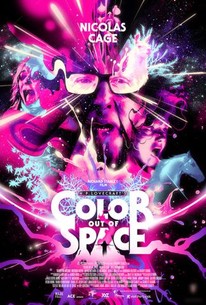 Nathan Gardner (Nicolas Cage) lives in farmhouse where he raises alpacas with his wife, Theresa (Joely Richardson), and three kids, Benny (Brendan Meyer), Lavinia (Madeleine Arthur) and Jack (Julian Hilliard). A hydrologist, Ward Phillips (Elliot Knight), shows up to investigate strange events in the area. One night, a meteor crashes into the front yard of the their home and unleashes an alien organism. Based on the short story by H.P. Lovecraft, Color Out of Space has a wildly imaginative concept that has fine balance between campiness, offbeat comedy, drama, horror and sci-fi elements during the first 30 minutes. The screenplay by writer/director Richard Stanley and co-writer Scarlett Amaris doesn't know where to take all of those elements to because the rest of the film quickly loses steam as it becomes increasingly bizarre and twisted. The events that take place during the final hour seem more like an excuse to show off the CGI effects. While beginning feels grounded with Nathan and his dysfunctional family each of whom has problems of their own, once the aliens gradually take over, the film runs out of clever ideas and stretches its plot too thinly. The result is an underwhelming experience that's more mind-numbing than mind-blowing. How many times do you have to hear a joke about Nathan being an alpaca farmer? The joke is funny the first time, but becomes less funny the second and third time around. Not surprisingly, Nicolas Cage yells and screams like a madman yet again in one particularly awkward scene. Is it a requirement for him to do that in every film these days? It's getting tiresome and annoying. Also, the filmmakers use a rather cheap way of manipulating the audience's emotions by showing the youngest child, Jack, in peril as he confronts the aliens. Unfortunately, the aliens themselves along with their intentions aren't very clear nor do you get a glimpse of what their life might be like back in their planet. On a positive note, the CGI and make-up effects do look great and colorful while making the most out of the limited budget. Just like in Mandy, you could easily turn the volume off and just look at the stylish visual effects which provide plenty of eye candy. It's too bad that the increasingly dumb and tedious Color Out of Space doesn't provide much candy for the mind and turns its B-movie premise into a lengthy C-level movie that should have been more of a wildly entertaining, guilty pleasure and much leaner at an excessive running time of 110 minutes. 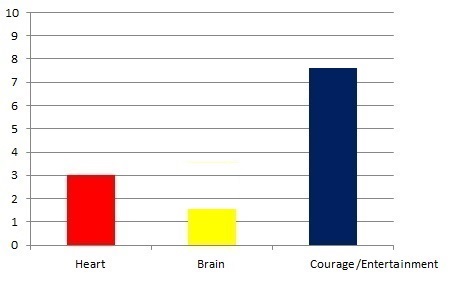 The Gentlemen 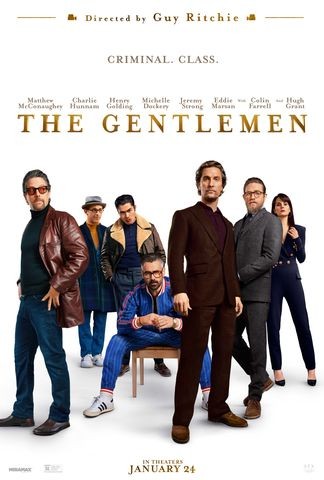
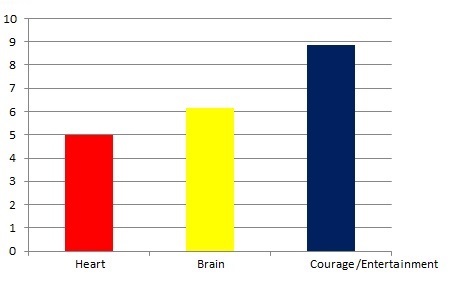 Get Gone 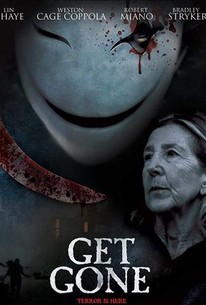
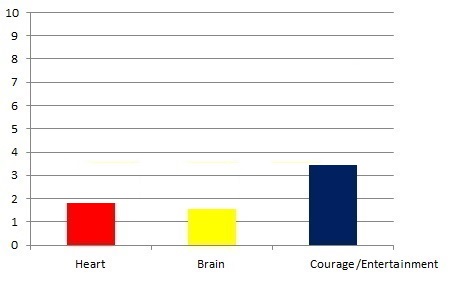 John Henry 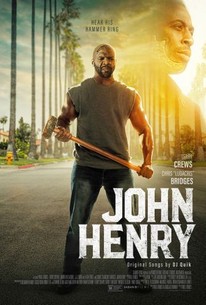 John Henry (Terry Crews) lives with hiw wheelchair-bound father, BJ (Ken Foree). he tries his best to avoid a violent lifestyle, but he has no option other than using violence when Berta (Jamila Velazquez) hides under his home from a neighborhood gang who kidnapped her and other women. John seeks revenge against the gang and their ruthless leader, Hell (Ludacris). Writer/director Will Forbes and co-writer Douglas Skinner include plenty of blood and guts along with slick cinematography, but forget to treat its titular protagonist like a human being. He seems like he's merely onscreen to move the plot along. The same can be said for the other characters. More often than not, dialogue sounds stilted and the editing is sub-par and choppy at times. There are some mildly amusing scenes with two of the gangsters having an argument together while sitting in a car that has shades of Tarantino's witty dialogue, but it doesn't come close to reaching that level. Vigilante stories need to have strong characters and at least something else that hooks the audience's attention, so it's too bad that John Henry falls flat both as a thriller and as a character study. Even on a visceral level, there's not much that's entertaining with poorly shot violent scenes and clunky editing. While it's refreshing to see Terry Crews in a larger role, it's too bad that he's stuck with a character who's forgettable and never comes to life. The filmmakers do deserve credit, though, for a bold ending that's un-Hollywood, although it adds an unsubtle message that feels tacked-on. At a running time of 91 minutes, which feels more like 2 hours, John Henry is a vapid, clunky and dull revenge thriller that offers no palpable thrills nor suspense. It's not nearly as entertaining as Kill Bill, John Wick or Grand Torino. 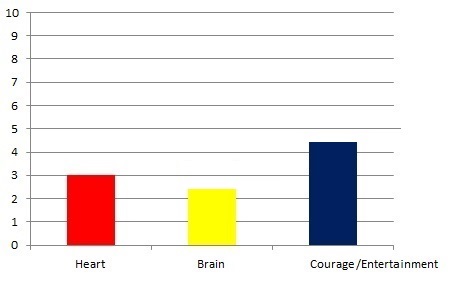 José  José (Enrique Salanic) lives in Guatemala City with his mother (Ana Cecilia Mota) while barely scrapping a living as a worker at a local restaurant. He spends his free time having sex with men via dating apps. One of the men, Luis (Manolo Herrera), becomes more than just a random hookup as their platonic relationship develops into a serious relationship. The screenplay by writer/director Li Cheng and co-writer George F. Roberson eschews any big events or twists and instead focuses on the emotional journey of José as he struggles with his sexual identity and finds love in a homophobic culture. There's no violence or any subplots that detract for the experiences of José, so there's nothing Hollywood about about this film. The pace moves slowly, at times even very slowly, so patient audiences will be rewarded the most. It's rare for a filmmaker to trust the audience's patience so much. Quiet often, you'll feel as though you were watching a documentary because everything looks so natural and the performance by Enrique Salanic is raw, organic and nuanced. The cinematography remains unpretentious and unshowy, so you might even forget that there's a camera as you're gradually drawn into José's life. Not a single scene feels contrived, schmaltzy or melodramatic thereby increasing the film's naturalism. There's very little exposition about José's backstory and he's laconic quite often, so you don't learn a lot about him despite that the film is centered around him. There are snippets of his personality which can be observed every now and then, but not enough to truly get to know him. He remains somewhat enigmatic by the end which makes him intriguing, but concurrently leaves you at an emotional distance from him. If only the filmmakers were to have provided a much bigger window into José's heart, mind and soul because although they do treat him as a human being, he's ultimately too much like a stranger to the audience. The ending, not surprisingly, is understated and somewhat abrupt leaving you with more questions about José's future with Luis than answers. At a running time of 85 minutes, José is a slow-burning and mildly engaging coming-of-age drama that's not quite as powerful nor moving as it could have been. 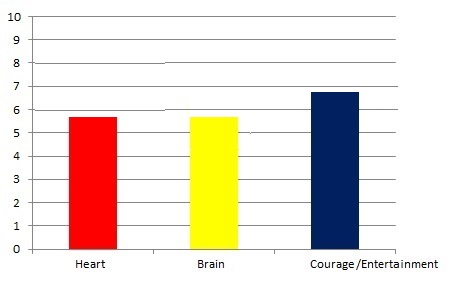 The Last Full Measure 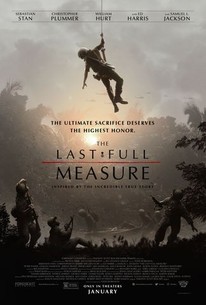 Scott Huffman (Sebastian Stan), a Pentagon staffer, investigates whether or not William H. Pitsenbarger (Jeremy Irvine), a U.S. Air Force Pararescueman who died during the Vietnam War, deserves to be awarded a Congressional Medal of Honor. Pitsenbarger could have escaped Vietnam with his fellow soldiers, but he chose to stay behind and to use his skills as a medic while saving the lives of over 60 soldiers before getting killed by enemy fire. With the help of the testimonies of the men he served with in Vietnam, namely, Tulley (William Hurt), Jimmy Burr (Peter Fonda), Takoda (Samuel L. Jackson) and Ray Mott (Ed Harris), Huffman sets out to prove that Pitsenbarger is a wartime hero. Christopher Plummer and Diane Ladd play Pitsenbarger's father and mother. Every movie manipulates the audience's emotions to at least some degree, but that's forgivable as long as the audience doesn't actually feel the manipulation. Unfortunately, The Last Full Measure has a screenplay by writer/director Todd Robinson that plods along slowly with scenes that last too long and suffers from preachiness and sappiness as though it were a smug, oversimplified faith-based movie like God's Not Dead or Courageous. You can feel the wheels of the screenplay turning every step of the way with the on-the-nose dialogue, i.e. when Takoda first meets Huffman on his riverside home and asks him point blank "Who are you?" and "What do you want?". That's a very lazy way of adding exposition. Then there are the excessive flashbacks to Pitsenbarger's experiences in the Vietnam war which leave too little to the imagination with gritty violence and even some gore. Those scenes juxtaposed with the slow-paced and dull family-friendly scenes in the present feel even. Who is the movie for? Perhaps the filmmakers didn't know who to make it for, so they tried to make it for everybody. Films made for everybody, though, rarely please anyone. The actors try their best to rise above the hackneyed, schmaltzy screenplay, but even Peter Fonda, Ed Harris and John Hurt don't quite manage to do so. It's great to see them together, though, and to finally see a movie with Samuel L. Jackson playing a role that does not require him to curse and yell a lot, but one could only wish they these talented actors had more natural dialogue and better-developed characters to play. The third act, which drags on way too long during a ceremony, is supposed to make you cry tears of joy, but the beats don't land because the uplifting ending remains unearned and the filmmakers try to hard to please the audience. Robinson fails to trust the audience's emotions and intelligence. If you don't mind the kind of movie that spoon-feeds you everything and has a heavy-handed message along with an intrusive musical score, The Last Full Measure might be at least a mildly engaging experience, but for everyone else, it's a lethargic, preachy, maudlin and clunky mess despite a fine cast. It's refreshing, though, to see a drama opening in hundreds of theaters for a change instead of day-and-date in a few theaters. 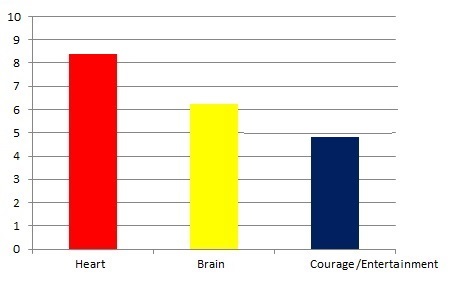 Quezon's Game 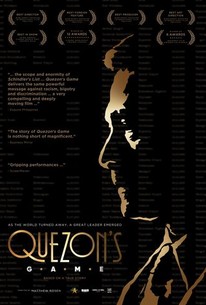 In 1938, Filipino President Manuel L. Quezon (Raymond Bagatsing) agreed to rescue Jews from the Nazis by allowing them to seek refuge in the Phillipines. With the help of American cigar businessman Alex Frieder (Billy Ray Gallion), U.S. President Dwight D. Eisenhower (David Bianco) and a U.S. diplomat, Paul NcNutt (James Paoleli), along with the emotional support of his wife, Aurora (Rachel Alejandro), he rescued 1,200 Jews from Nazi Germany. Quezon's Game suffers from wooden performances and a poorly written screenplay that could have been a poignant and riveting drama given the subject matter. The dialogue by Janice Y. Perez and Dean Rosen sounds stilted too often with awkward and lazy exposition that fails to bring any of the characters to life. That's a huge disappointment because Quezon is an interesting and heroic character much like Oscar Schindler. The relationship between him and his wife isn't explored enough while the drama surrounding his plans to rescue the Jews just goes the the motions and similarly falls flat. Too much of the film feels dry like toast with not nearly enough warmth, levity or anything to ground the film in much-needed humanism. The pace moves slowly with scenes that drag, and none of the beats land, especially in the third act that supposed to be uplifting. It's unfortunate that Quezon's Game never earns its uplift nor does it shed light into any of its characters heart, mind and soul. The cinematography, editing and musical score don't help to enliven the film, either. At a running time of 2 hours and 6 minutes that feels more like 4 hours, it's a monotonous, clunky and anemic drama. 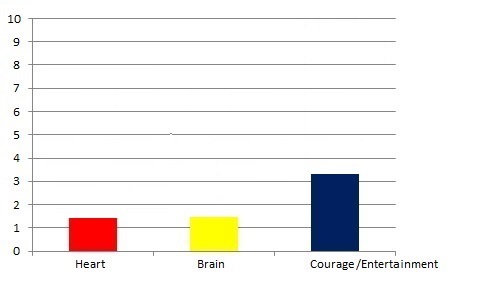 The Turning 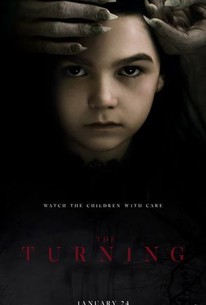
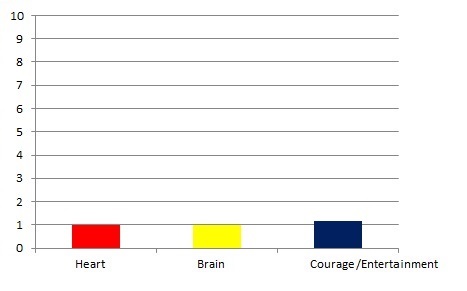 Main Page Alphabetical Menu Chronological Menu ______________________________________________________ |
The NYC Movie Guru
themovieguru101@yahoo.com
Privacy Policy